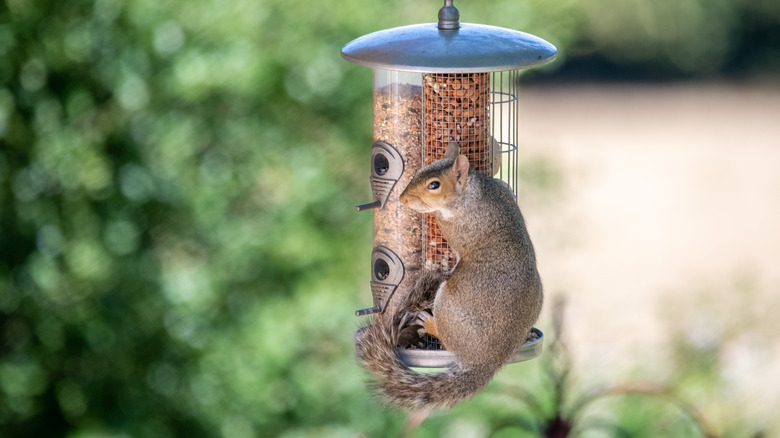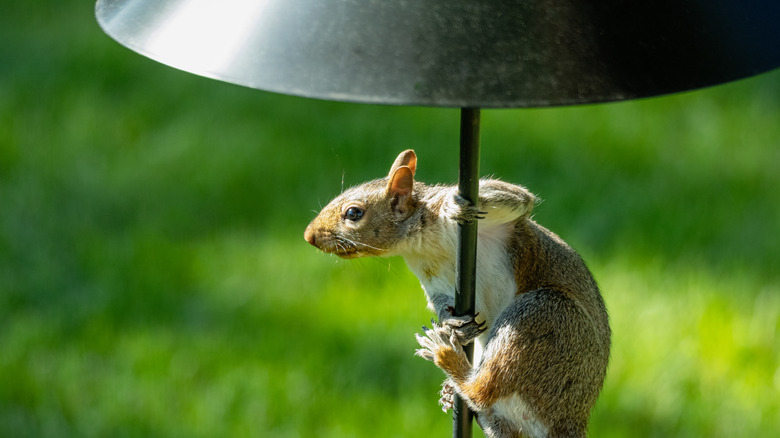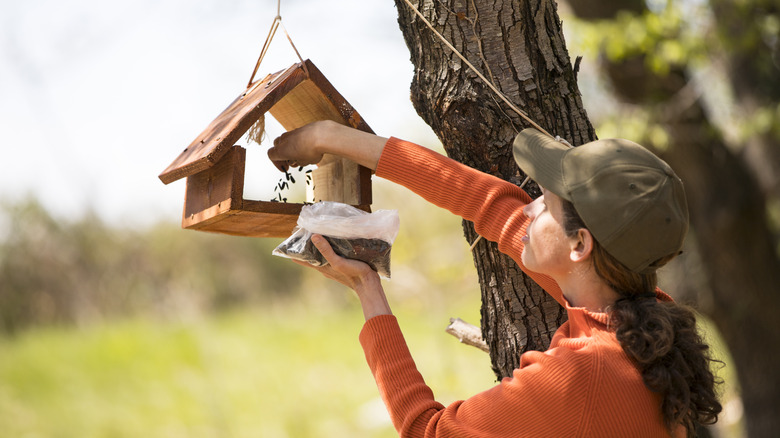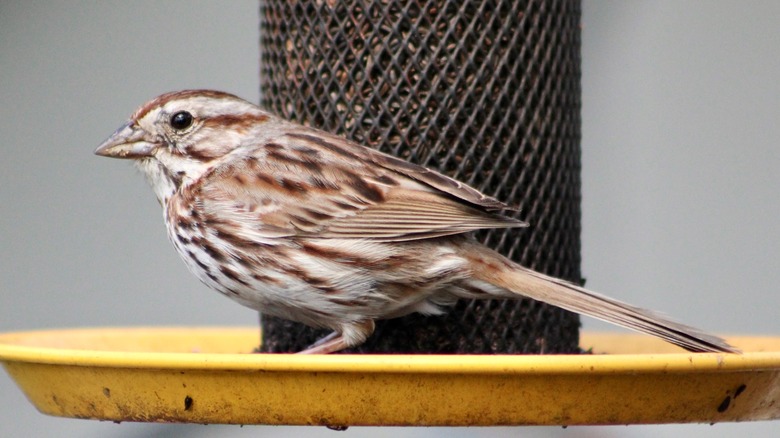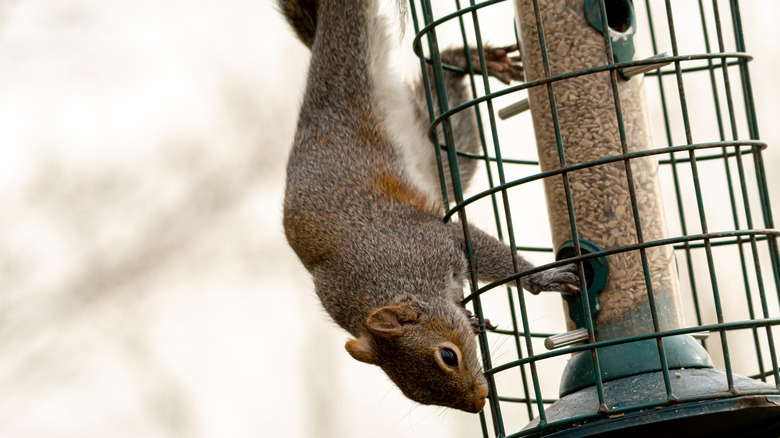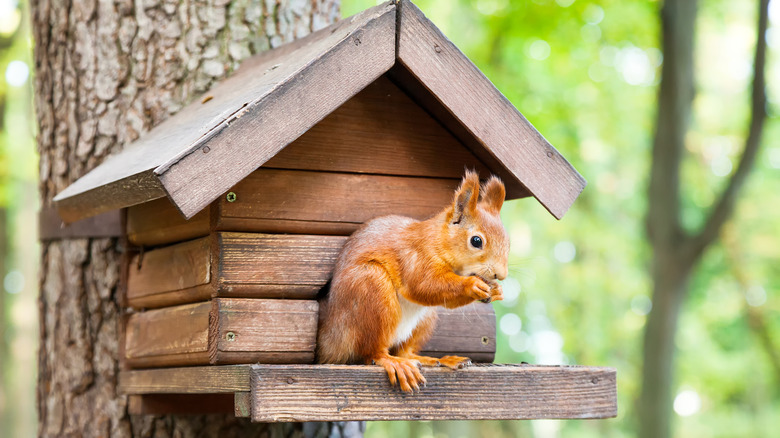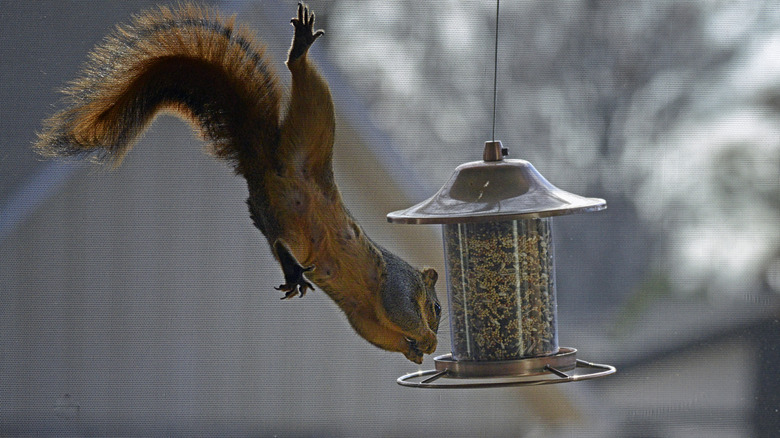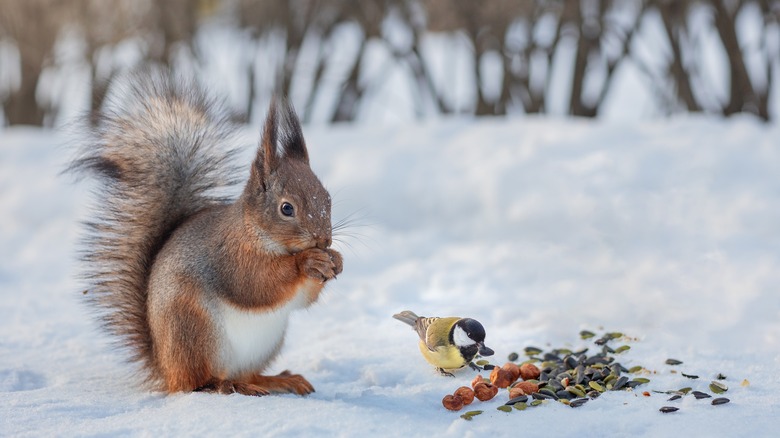The 7 Best Ways To Keep Squirrels Out Of Your Bird Feeder
We may receive a commission on purchases made from links.
Squirrels are cheeky critters. It's part of their appeal. Watching their amusing antics in your yard is one of life's simple pleasures. However, these bushy-tailed rascals can soon become aggressive and ill-mannered hooligans when they turn their little beady eyes to your bird feeders. Squirrels go nuts about bird seed, particularly in the fall when the temperature drops, and they become a little manic in their desire to forage and feast. Your bird feeder is often viewed by these tenacious rodents as easy pickings. However, birds need to eat just as much as squirrels, and it's your job to ensure our feathered friends get what's rightfully theirs.
Squirrels are renowned for performing some pretty death-defying acrobatics if anything stands between them and some tasty nibbles. Their gritty determination is laudable, and their innovative approach is inspiring. It makes keeping them out of your bird feeder seem like an impossible task. However, it's not — you just need to play them at their own game and think outside of the box. Whether you choose spicy deterrents or other food options, getting creative is key. By using one or a combination of measures below, you can help maintain mother nature's delicate balance while keeping squirrels away from your bird feeder.
Baffle them senseless
Squirrels love to climb and jump, and a bird feeder hung from a tree or situated on a pole is usually easily within their reach. A simple baffle can help confound their thieving ways and make the road to an easy feast a little more tricky. These dome-shaped barriers are simple to install but extremely effective. There is a range of baffles on the market that are affordable and pose no risk to the welfare of the squirrels. They are easy to install, and you can place them on the pole below the feeder to stop the rodents from climbing to a bird feeder table. Or, if it is hanging from a tree, you can place it above to stop squirrels from leaping from a nearby branch.
If you prefer, you can get creative and make one yourself out of a wooden or plastic bowl of your choice. Simply drill a hole in the top for installation purposes, which will vary depending on where you are hanging it. This option is a bit trickier, but it allows you to pick a design and color that is unique to your feeder. Although baffles will help confound the squirrels, they are not completely foolproof. RSPB product manager of bird care and optics, Matthew Tume, told The Independent, "Squirrels are very intelligent and very determined, and they will find ways around things." However, a baffle is a good first line of defense.
Spice things up with a little chili or cayenne pepper
Squirrels like to eat a lot of things and will do some pretty daredevil things to get their claws on them, but a little chili or cayenne pepper will ruin their party every single time. To put this hack into practice, simply take a little spice and splash it over your birdseed. Stir it in thoroughly and then put the mixture into your bird feeder. There's an ingredient in spicy substances called capsaicin. And it's this that makes our eyes water and taste buds feel like there's a volcano erupting in them. Although many humans enjoy testing their constitutions against a plate of super-strength chili, squirrels cannot abide the smell or taste and will go out of their way to avoid it.
If you're worried that the frequent fliers that flock to your feeder might be deterred or have an adverse reaction to having their seed spiced up significantly, fear not. Although the bushy-tailed brigade might shudder at the thought of eating anything plastered with chili or cayenne pepper, it doesn't appear to bother our feathered friends at all. Although their chirpy little palettes are capable of recognizing and even appreciating a little spice, the capsaicin doesn't cause a burning or irritable sensation in their mouths or digestive tract as it does in mammals.
Try a birdseed that's not on a squirrel's menu
If you cannot abide the thought of coating the seed in your bird feeder with a little chili or cayenne pepper, then why not opt for some feed that is not on the squirrel's menu? A bird needs a lot of calories, particularly when it's cold if they're to stay airborne and keep warm. As such, they're not particularly fussy eaters and will eat a wide range of food. Squirrels, on the other hand, are a bit more selective in the culinary department. They turn up their little twitching noses at nyjer seeds, and they are not too fond of white proso millet either. If you stir in some of these seeds to the mix, there's a good chance the rodents will give up trying to sift through the seeds they cannot stomach and go elsewhere.
Why can't you fill your feeders completely with nyjer seeds to ensure you deter the squirrels completely? The trouble is nyjer does not have the same universal appeal for all backyard birds as, say, sunflower seeds do. So solely putting out nyjer seed to deter the squirrels is a bit like cutting off your nose to spite your face. It's a popular misconception that squirrels will not eat safflower seeds either. Although they may at first refuse safflower if they're used to gorging on sunflower seeds and peanuts, they can and will force themselves to get used to it if it's the only food on the menu. At best, putting out safflower seeds is a stop-gap measure.
Try a squirrel-proof bird feeder
If you want an industrial-size solution to the problem of squirrels raiding your bird seed, then you could opt to invest in a purpose-designed squirrel-proof bird feeder. There's a wide range available. Founder and CEO of Pest Keen Gulshan Hajara Basnu told Homes & Gardens, "Invest in a feeder specifically designed to keep squirrels out, such as one with a weight-activated barrier that closes the feeding ports when a squirrel lands on it." She added, "These types of feeders can be highly effective, but it's important to choose one that is well-made and durable to ensure it lasts." The Jacobi Jayne SB-M Squirrel Proof Bird Feeder is one such example.
For a more traditional approach, you could surround the bird feeder with a squirrel guard cage that has an entrance and gaps big enough for small birds but not adequate for squirrels. However, this solution is no good if your prime concern is attracting larger birds to your yard. Battery-powered feeders that spin as soon as a squirrel steps on them, such as the Yankee Flipper Squirrel-Proof Wild Bird Feeder, are also a good deterrent. Rachel Schofield, of CJ Wildlife, told The Independent, "There's a great number of really good squirrel-proof feeders on the market, as far as adult squirrels are concerned, Juveniles, however, can squeeze through protective cages." Matthew Tume added that although no products are 100% squirrel-proof, metal is always better than plastic. "Squirrels can chew through plastic ports, so we would recommend you use metal feeders rather than plastic ones," he stressed.
Offer them a more accessible food source
Squirrels are not raiding your bird feeder because they're hellbent on making your life miserable. They simply need to eat, and they see the seed in your feeder as an open invite to a bit of fine dining. It contains a plentiful and seemingly never-ending food supply abundant in fats, protein, and carbohydrates. No wonder they cannot resist its allure. However, if you can't beat them, then offer them a more easily accessible food source. A purpose-designed squirrel feeder situated in a space far from your bird feeders will divert their attention. Fill it full of appealing snacks such as sunflower seeds, corn, and peanuts, and they'll soon appreciate they're expending unnecessary effort trying to break into your bird feeder.
This solution is perfect for those who enjoy the company of our bushy-tailed friends and love to watch their amusing and playful antics without worrying about them stealing from the birds. However, there is a caveat, and it's a big one! By offering the squirrels an easy fix to take their fill, you're also at risk of inviting a host of other wild animals to your yard, such as deer, raccoon, and rats. It's worth noting that many wildlife experts frown upon feeding squirrels. The USDA website notes, "Wild animals have specialized diets, and they can become malnourished or die if fed the wrong foods." There are also concerns that squirrels will become too reliant on being fed by humans and could become more aggressive as their instinctive fear of humans is diminished.
Position your bird feeder in a harder-to-reach spot
As well as being tenacious, squirrels are very athletic. They are accomplished at climbing poles, and they can jump incredibly long distances. They dig and swim, and their bushy tails aren't just there to make them look cute — they help give them a remarkable sense of balance. The placement of your bird feeder is crucial when it comes to deterring squirrels. Keeping your bird feeder far from anything a squirrel can climb to gain access — such as fences, walls, and tree trunks — will help limit their access. It's recommended that you position your bird feeder in accordance with the 5-7-9 rule. Because these resilient little rodents do not usually jump more than five feet vertically, seven feet horizontally, or commit themselves to a drop more than nine feet, any bird feeders placed within that zone should be safe from their foraging.
However, best-laid plans have a habit of falling by the wayside, and a squirrel's reach often exceeds what's expected. Who hasn't marveled at these beady-eyed little daredevils leaping from tree to tree, scaling roofs, and scurrying across overhead cable lines? Is any location safe and secure enough to prevent these natural athletes from getting their claws on your bird feed? Well, it doesn't hurt to try! Thinking about the location of your feeder will definitely play a part in your overall strategy.
Keep the area around your bird feeder clean
Once you've implemented one or a combination of the above measures, there's an additional step you can take to ensure the squirrels that you're trying to keep away, stay away. And it's a simple matter of keeping the area around your bird feeder clean and orderly. Gulshan Hajara Banu, founder and CEO of Pest Keen told Homes & Gardens, "Squirrels will often raid a feeder if they find spilled seed or hulls on the ground. Keep the area around the feeder clean and free of debris to discourage them from investigating." By keeping the area in the vicinity of your feeder free of dropped feed, you are also actively discouraging other more unwelcome visitors from entering your yard, such as mice and rats.
Keeping the area around your bid feeder clean helps reduce the risk of transmission of diseases like Trchonomosis. It also helps make your yard look a lot more aesthetically pleasing. Banu added, "It's important to remember that squirrels are wild animals and should be treated humanely." Although you may feel it's crucial to prevent them from eating all the seed in your bird feeder, she stressed, "It's also important to consider the overall health and well-being of the squirrels in your backyard." With a little bit of understanding, innovation, and work, it's possible to create a yard where you, birds, and squirrels can co-exist harmoniously.
